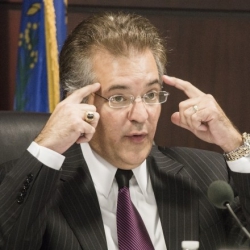
Tony Alamo of the Nevada Gaming Control Board said he was not comfortable allowing casinos to permit “a felonious act to occur anywhere in their property.”
Lost in the drama of the November 8 national election was the fact that the Nevada Marijuana Legalization Initiative (Question 2) was approved in Nevada.
Known as Question 2, the referendum approved the use of recreational marijuana in the state of Nevada.
The vote means that adults in Nevada, including residents and visitors, are able to carry one ounce of marijuana or 1/8 ounce of concentrated marijuana, starting in 2017.
2014 Referendum on Medicinal Marijuana
The approval comes after a 2014 referendum which allowed the carrying and use of medicinal marijuana, if the person carrying the euphoric drug had a prescription from a licensed doctor. After the 2014 decision, Las Vegas casinos banned the carrying of medicinal marijuana inside their resorts, hotels, and gaming spaces.
The Nevada Gaming Commission and Nevada Gaming Control Board discussed the impact of Question 2 on their industry. The majority of members on both government bodies agreed that the Nevada casino industry should have no ties to the burgeoning marijuana industry.
NGC and NGCB Bans on Marijuana
Thus, the NGC and NGCB maintained their ban against carrying of marijuana of any kind onto the grounds of a casino-resort. Nevada’s gaming regulators want to maintain a firewall between the two forms of activity in their state, due to a continuing federal ban on marijuana.
Tony Alamo, the Gaming Commission Chairman, said in a statement, “It comes down to something very simple. Maybe the emperor has no clothes. In no way do I feel comfortable in my role as regulator to allow a licensee to permit a felonious act to occur anywhere in their property.”
Marijuana Is a Banned Substance under Federal Laws
In the thinking of Nevada gaming regulators, the federal ban on marijuana still trumps state laws in regards to marijuana. Casinos are regulated closely by the federal authorities, because of the heightened risks of money laundering allowed by the large exchange of cash in a casino.
Casino owners and gaming officials want to maintain a strict, legal propriety when it comes to federal laws. In essence, they do not want to see federal agents busting people of any crime in a casino, because it brings an unwanted attention.
The ruling goes well beyond federal drug busts, though. When the medicinal marijuana bill was passed in 2014, regulators feared that casino executives might invest in the nascent marijuana industry. The new business is likely to be lucrative and gaming executives are flush with cash to invest in such industries.
Regulators Fear Federal Drug Busts
Because federal authorities view the selling of marijuana as illegal, Nevada officials do not want to see casino operators involved in the sell of marijuana, even if it’s a legal substance under Nevada law. It would invite potential scrutiny or even enforcement by the FBI and DEA, which might lead to prosecutions against casino officials or scrutiny by the IRS.
To assure no such thing is allowed, Tony Alamo and AG Burnett want to maintain a strict ban on any ties between casinos and marijuana. While those who voted to have recreational marijuana might be disappointed that they cannot smoke weed legally in the Las Vegas Strip casinos, it is necessary to maintain an uninterrupted flow of business at the casinos.
Jeff Sessions at the Department of Justice
The importance of maintaining federal legality might be even more important under the Trump Administration. If Alabama Sen. Jeff Sessions is confirmed as the next US Attorney General (and he’s almost certain to be), then Sessions is going to be the most anti-marijuana attorney general in decades.
Jeff Sessions is on the record saying that the legalization of marijuana in several US states is one of President Barack Obama’s “biggest failures“.
In an April 2016 congressional hearing on legalization efforts, Sen. Sessions said, “Good people don’t smoke marijuana. We need grownups in charge in Washington saying marijuana is not the kind of thing that ought to be legalized, it ought to be minimized, that it is in fact a very real danger.”
With Sessions as the nation’s top prosecutor, maintaining propriety is foremost in the minds of Nevada’s gaming regulators.
Pot Wins in California and Massachusetts
The November 8 election was a big night for advocates of legal marijuana, as initiatives passed in California, Massachusetts, and Nevada. International Business Times speculated the day after the election that Texas and Virginia might be the next two states to decriminalize marijuana. Both are traditionally conservative southern states, though Virginia leans more towards the Democrats in recent elections, because of the influence of Northern Virginia.
Texas is one of the corridors that the illegal marijuana trade has entered the country via Mexico. Legalizing pot in the Lone Star State would mean fewer shipments of illegal contraband would enter the state, though plenty would continue to flow through, due to the ban in dozens of other US states.
